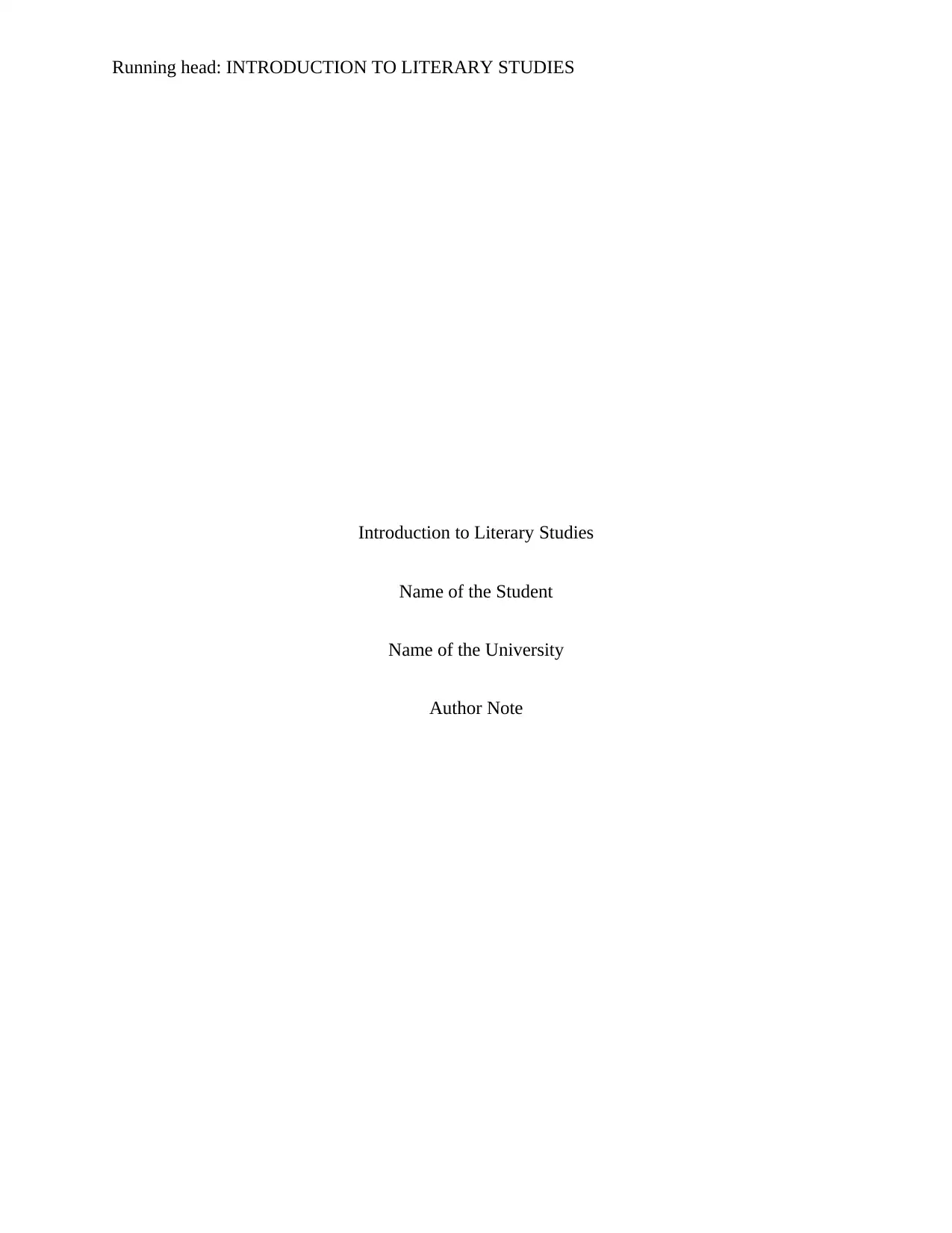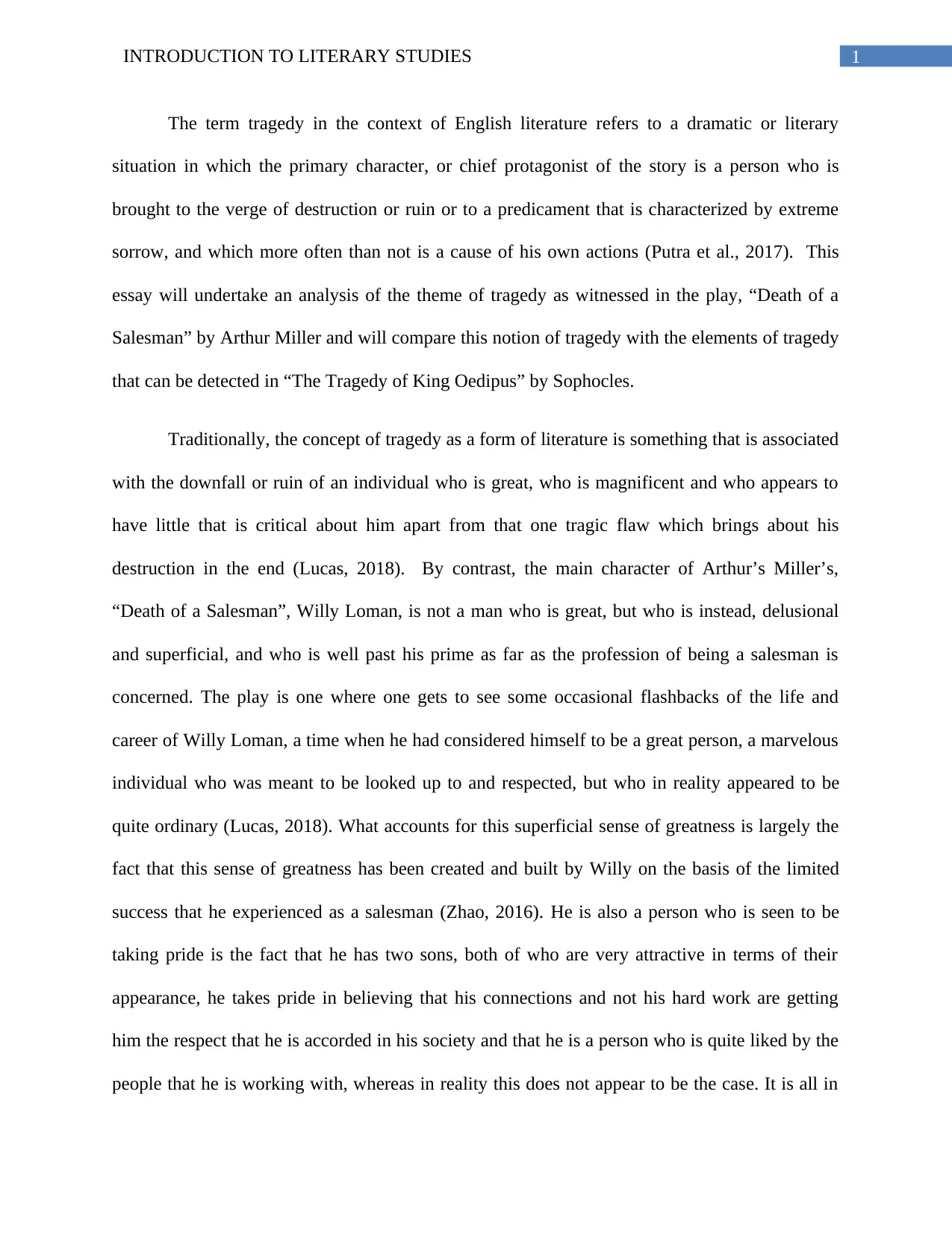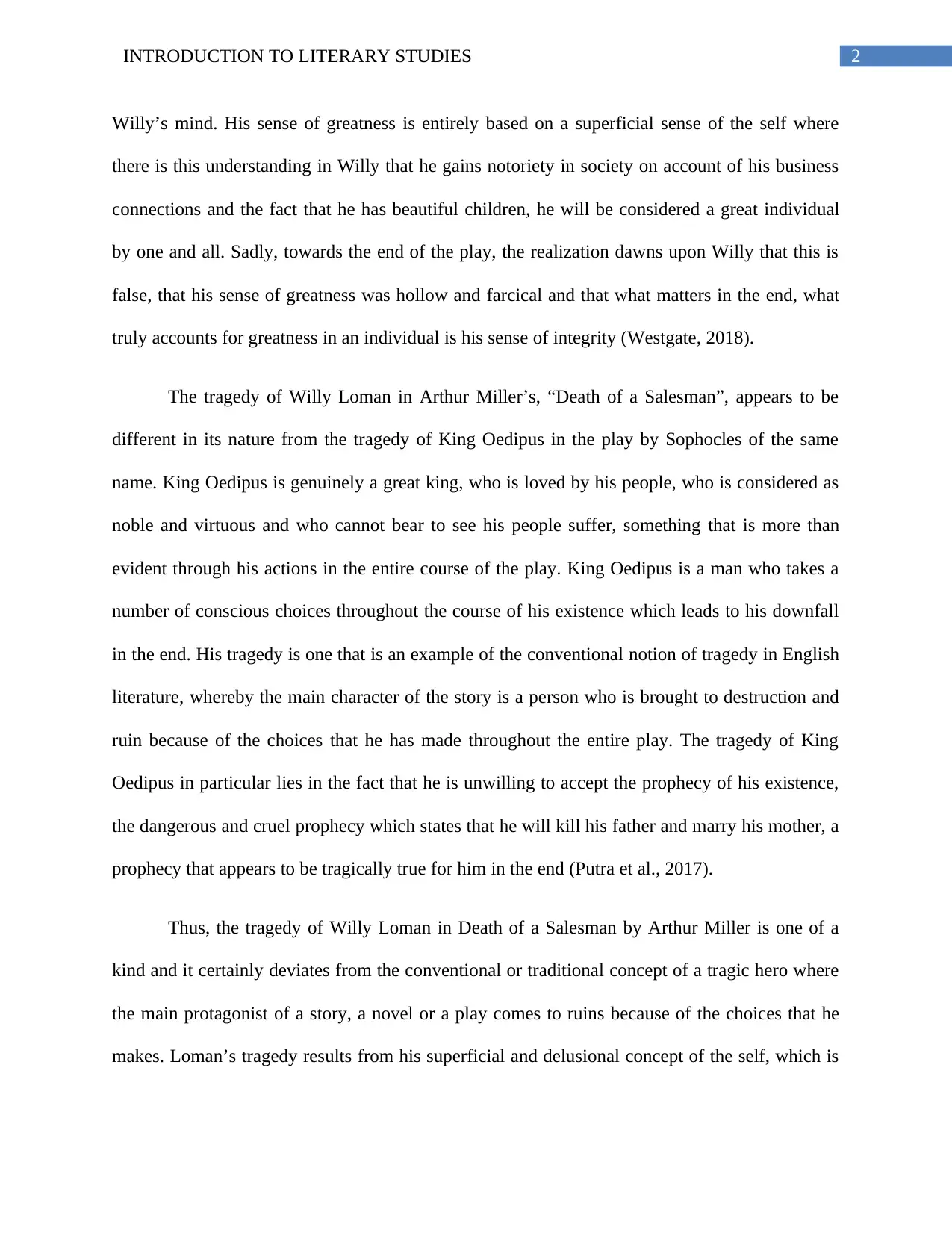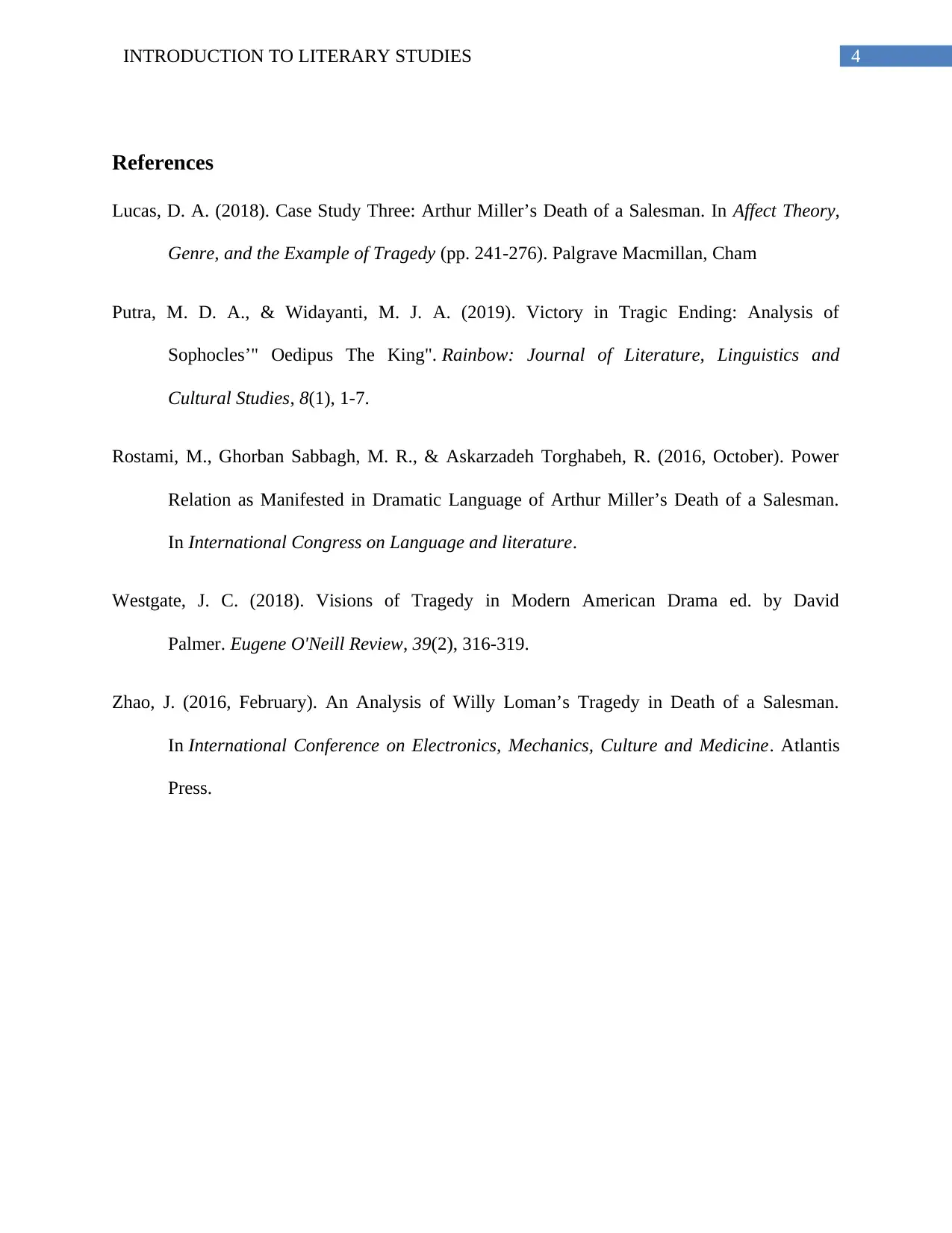Comparative Analysis of Tragedy in Arthur Miller and Sophocles' Plays
VerifiedAdded on 2022/11/01
|5
|1140
|406
Essay
AI Summary
This essay undertakes a comparative analysis of the theme of tragedy as depicted in Arthur Miller's "Death of a Salesman" and Sophocles' "The Tragedy of King Oedipus." It explores the contrasting portrayals of the tragic hero in both plays, highlighting the differences in their downfalls. While King Oedipus embodies the traditional tragic hero whose actions lead to his ruin, Willy Loman's tragedy stems from his delusional self-perception and superficial values. The essay examines the characters' flaws, their relationships, and the consequences of their choices, revealing how Miller departs from the conventional notion of tragedy by focusing on a character whose downfall is rooted in a disconnect from reality. The analysis delves into the characters' motivations, the societal context, and the underlying themes of each play to provide a comprehensive understanding of tragedy's diverse manifestations in literature.

Running head: INTRODUCTION TO LITERARY STUDIES
Introduction to Literary Studies
Name of the Student
Name of the University
Author Note
Introduction to Literary Studies
Name of the Student
Name of the University
Author Note
Paraphrase This Document
Need a fresh take? Get an instant paraphrase of this document with our AI Paraphraser

1INTRODUCTION TO LITERARY STUDIES
The term tragedy in the context of English literature refers to a dramatic or literary
situation in which the primary character, or chief protagonist of the story is a person who is
brought to the verge of destruction or ruin or to a predicament that is characterized by extreme
sorrow, and which more often than not is a cause of his own actions (Putra et al., 2017). This
essay will undertake an analysis of the theme of tragedy as witnessed in the play, “Death of a
Salesman” by Arthur Miller and will compare this notion of tragedy with the elements of tragedy
that can be detected in “The Tragedy of King Oedipus” by Sophocles.
Traditionally, the concept of tragedy as a form of literature is something that is associated
with the downfall or ruin of an individual who is great, who is magnificent and who appears to
have little that is critical about him apart from that one tragic flaw which brings about his
destruction in the end (Lucas, 2018). By contrast, the main character of Arthur’s Miller’s,
“Death of a Salesman”, Willy Loman, is not a man who is great, but who is instead, delusional
and superficial, and who is well past his prime as far as the profession of being a salesman is
concerned. The play is one where one gets to see some occasional flashbacks of the life and
career of Willy Loman, a time when he had considered himself to be a great person, a marvelous
individual who was meant to be looked up to and respected, but who in reality appeared to be
quite ordinary (Lucas, 2018). What accounts for this superficial sense of greatness is largely the
fact that this sense of greatness has been created and built by Willy on the basis of the limited
success that he experienced as a salesman (Zhao, 2016). He is also a person who is seen to be
taking pride is the fact that he has two sons, both of who are very attractive in terms of their
appearance, he takes pride in believing that his connections and not his hard work are getting
him the respect that he is accorded in his society and that he is a person who is quite liked by the
people that he is working with, whereas in reality this does not appear to be the case. It is all in
The term tragedy in the context of English literature refers to a dramatic or literary
situation in which the primary character, or chief protagonist of the story is a person who is
brought to the verge of destruction or ruin or to a predicament that is characterized by extreme
sorrow, and which more often than not is a cause of his own actions (Putra et al., 2017). This
essay will undertake an analysis of the theme of tragedy as witnessed in the play, “Death of a
Salesman” by Arthur Miller and will compare this notion of tragedy with the elements of tragedy
that can be detected in “The Tragedy of King Oedipus” by Sophocles.
Traditionally, the concept of tragedy as a form of literature is something that is associated
with the downfall or ruin of an individual who is great, who is magnificent and who appears to
have little that is critical about him apart from that one tragic flaw which brings about his
destruction in the end (Lucas, 2018). By contrast, the main character of Arthur’s Miller’s,
“Death of a Salesman”, Willy Loman, is not a man who is great, but who is instead, delusional
and superficial, and who is well past his prime as far as the profession of being a salesman is
concerned. The play is one where one gets to see some occasional flashbacks of the life and
career of Willy Loman, a time when he had considered himself to be a great person, a marvelous
individual who was meant to be looked up to and respected, but who in reality appeared to be
quite ordinary (Lucas, 2018). What accounts for this superficial sense of greatness is largely the
fact that this sense of greatness has been created and built by Willy on the basis of the limited
success that he experienced as a salesman (Zhao, 2016). He is also a person who is seen to be
taking pride is the fact that he has two sons, both of who are very attractive in terms of their
appearance, he takes pride in believing that his connections and not his hard work are getting
him the respect that he is accorded in his society and that he is a person who is quite liked by the
people that he is working with, whereas in reality this does not appear to be the case. It is all in

2INTRODUCTION TO LITERARY STUDIES
Willy’s mind. His sense of greatness is entirely based on a superficial sense of the self where
there is this understanding in Willy that he gains notoriety in society on account of his business
connections and the fact that he has beautiful children, he will be considered a great individual
by one and all. Sadly, towards the end of the play, the realization dawns upon Willy that this is
false, that his sense of greatness was hollow and farcical and that what matters in the end, what
truly accounts for greatness in an individual is his sense of integrity (Westgate, 2018).
The tragedy of Willy Loman in Arthur Miller’s, “Death of a Salesman”, appears to be
different in its nature from the tragedy of King Oedipus in the play by Sophocles of the same
name. King Oedipus is genuinely a great king, who is loved by his people, who is considered as
noble and virtuous and who cannot bear to see his people suffer, something that is more than
evident through his actions in the entire course of the play. King Oedipus is a man who takes a
number of conscious choices throughout the course of his existence which leads to his downfall
in the end. His tragedy is one that is an example of the conventional notion of tragedy in English
literature, whereby the main character of the story is a person who is brought to destruction and
ruin because of the choices that he has made throughout the entire play. The tragedy of King
Oedipus in particular lies in the fact that he is unwilling to accept the prophecy of his existence,
the dangerous and cruel prophecy which states that he will kill his father and marry his mother, a
prophecy that appears to be tragically true for him in the end (Putra et al., 2017).
Thus, the tragedy of Willy Loman in Death of a Salesman by Arthur Miller is one of a
kind and it certainly deviates from the conventional or traditional concept of a tragic hero where
the main protagonist of a story, a novel or a play comes to ruins because of the choices that he
makes. Loman’s tragedy results from his superficial and delusional concept of the self, which is
Willy’s mind. His sense of greatness is entirely based on a superficial sense of the self where
there is this understanding in Willy that he gains notoriety in society on account of his business
connections and the fact that he has beautiful children, he will be considered a great individual
by one and all. Sadly, towards the end of the play, the realization dawns upon Willy that this is
false, that his sense of greatness was hollow and farcical and that what matters in the end, what
truly accounts for greatness in an individual is his sense of integrity (Westgate, 2018).
The tragedy of Willy Loman in Arthur Miller’s, “Death of a Salesman”, appears to be
different in its nature from the tragedy of King Oedipus in the play by Sophocles of the same
name. King Oedipus is genuinely a great king, who is loved by his people, who is considered as
noble and virtuous and who cannot bear to see his people suffer, something that is more than
evident through his actions in the entire course of the play. King Oedipus is a man who takes a
number of conscious choices throughout the course of his existence which leads to his downfall
in the end. His tragedy is one that is an example of the conventional notion of tragedy in English
literature, whereby the main character of the story is a person who is brought to destruction and
ruin because of the choices that he has made throughout the entire play. The tragedy of King
Oedipus in particular lies in the fact that he is unwilling to accept the prophecy of his existence,
the dangerous and cruel prophecy which states that he will kill his father and marry his mother, a
prophecy that appears to be tragically true for him in the end (Putra et al., 2017).
Thus, the tragedy of Willy Loman in Death of a Salesman by Arthur Miller is one of a
kind and it certainly deviates from the conventional or traditional concept of a tragic hero where
the main protagonist of a story, a novel or a play comes to ruins because of the choices that he
makes. Loman’s tragedy results from his superficial and delusional concept of the self, which is
⊘ This is a preview!⊘
Do you want full access?
Subscribe today to unlock all pages.

Trusted by 1+ million students worldwide

3INTRODUCTION TO LITERARY STUDIES
far removed from reality and which accounts for his tragedy in the play, making him ultimately
realize that he is far from great, and nothing better than an ordinary salesman.
far removed from reality and which accounts for his tragedy in the play, making him ultimately
realize that he is far from great, and nothing better than an ordinary salesman.
Paraphrase This Document
Need a fresh take? Get an instant paraphrase of this document with our AI Paraphraser

4INTRODUCTION TO LITERARY STUDIES
References
Lucas, D. A. (2018). Case Study Three: Arthur Miller’s Death of a Salesman. In Affect Theory,
Genre, and the Example of Tragedy (pp. 241-276). Palgrave Macmillan, Cham
Putra, M. D. A., & Widayanti, M. J. A. (2019). Victory in Tragic Ending: Analysis of
Sophocles’" Oedipus The King". Rainbow: Journal of Literature, Linguistics and
Cultural Studies, 8(1), 1-7.
Rostami, M., Ghorban Sabbagh, M. R., & Askarzadeh Torghabeh, R. (2016, October). Power
Relation as Manifested in Dramatic Language of Arthur Miller’s Death of a Salesman.
In International Congress on Language and literature.
Westgate, J. C. (2018). Visions of Tragedy in Modern American Drama ed. by David
Palmer. Eugene O'Neill Review, 39(2), 316-319.
Zhao, J. (2016, February). An Analysis of Willy Loman’s Tragedy in Death of a Salesman.
In International Conference on Electronics, Mechanics, Culture and Medicine. Atlantis
Press.
References
Lucas, D. A. (2018). Case Study Three: Arthur Miller’s Death of a Salesman. In Affect Theory,
Genre, and the Example of Tragedy (pp. 241-276). Palgrave Macmillan, Cham
Putra, M. D. A., & Widayanti, M. J. A. (2019). Victory in Tragic Ending: Analysis of
Sophocles’" Oedipus The King". Rainbow: Journal of Literature, Linguistics and
Cultural Studies, 8(1), 1-7.
Rostami, M., Ghorban Sabbagh, M. R., & Askarzadeh Torghabeh, R. (2016, October). Power
Relation as Manifested in Dramatic Language of Arthur Miller’s Death of a Salesman.
In International Congress on Language and literature.
Westgate, J. C. (2018). Visions of Tragedy in Modern American Drama ed. by David
Palmer. Eugene O'Neill Review, 39(2), 316-319.
Zhao, J. (2016, February). An Analysis of Willy Loman’s Tragedy in Death of a Salesman.
In International Conference on Electronics, Mechanics, Culture and Medicine. Atlantis
Press.
1 out of 5
Your All-in-One AI-Powered Toolkit for Academic Success.
+13062052269
info@desklib.com
Available 24*7 on WhatsApp / Email
![[object Object]](/_next/static/media/star-bottom.7253800d.svg)
Unlock your academic potential
Copyright © 2020–2026 A2Z Services. All Rights Reserved. Developed and managed by ZUCOL.


